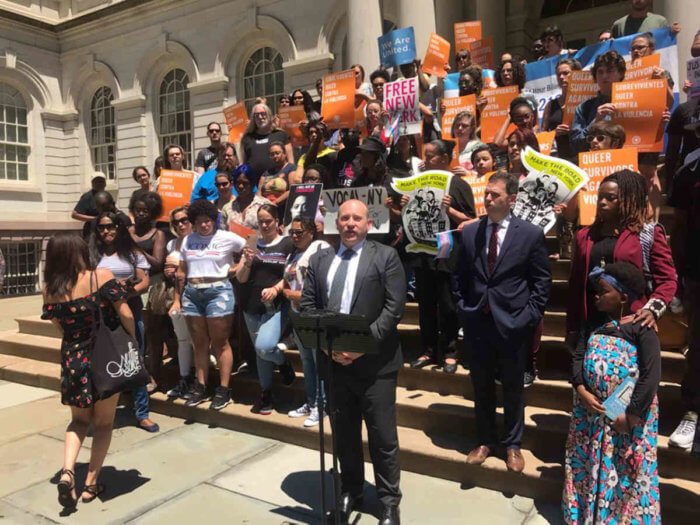New York Mayor Bill de Blasio acted to suspend nearly a dozen and a half Department of Correction (DOC) employees in the wake of a report from the board overseeing the department that concluded jail officials responsible for the well-being of Layleen Xtravaganza Cubilette-Polanco leading up to her death at Rikers last year failed to properly monitor her, neglected her serious health issues, and felt “increased pressure” to place her alone because of department rules against housing trans women in the general population.
In addition to the June 26 action by the mayor and DOC Commissioner Cynthia Brann, the board’s findings drew national attention from prominent members of Congress.
The Board of Correction issued the damning June 23 report summing up the investigation into the circumstances surrounding Polanco’s death one year to the month after she died in her restrictive housing cell — a form of solitary confinement — on June 6, 2019, due to seizures caused by epilepsy. Rikers officials left her alone for extended periods of time despite having full knowledge of her multiple health conditions.
Findings draw national attention as Jumaane Williams, AOC, Elizabeth Warren condemn Rikers officials
“The death of Layleen Polanco was an incredibly painful moment for our city,” de Blasio said in a written statement. “What happened to Layleen was absolutely unacceptable and it is critical that there is accountability.”
The mayor and the commissioner announced that 17 officers would be suspended; four of them, including a captain, face their suspensions without pay.
“We are committed to ensuring that all of our facilities are safe and humane,” Brann said. “Even one death in our custody is one too many and this swift and fair determination on internal discipline makes clear that the safety and well-being of people in our custody remains our top priority.”
Senator Elizabeth Warren of Massachusetts and Representative Alexandria Ocasio-Cortez of the Bronx and Queens had earlier in the week issued statements on the report’s findings. Both lawmakers used the opportunity to call for an end to cash bail and solitary confinement in light of the fact that Polanco was being held on $500 bail — partly due to a sex work-related charge — and died alone in restrictive housing. Ocasio-Cortez also said correction officers involved in Polanco’s case must be fired.
The report also called out DOC staffers for failing to frequently check on Polanco. Jail guards were supposed to be checking on her every 15 minutes but instead left her alone on three separate occasions for 57 minutes, 47 minutes, and 41 minutes. The report stated that guards said they were “confused” about the policy regarding how often they should have been making their rounds.
The entire justification for Polanco being kept in restrictive housing stemmed from an alleged physical altercation she had with another person in jail, according to the report. Polanco was charged with an “infraction” and at a May 14 disciplinary hearing she was sentenced to 20 days in solitary confinement. She also “was involved in another fight with someone in her dorm” on the same day as the hearing, and in the following days started to show increasing signs of emotional distress and mental health instability — perhaps due to harsh treatment she received when suffering seizures in the weeks leading up to the disciplinary hearing.

Polanco endured severe emotional distress and allegedly “charged at [an] officer with her fist out, striking the officer’s arm,” prompting officials to transfer her to Elmhurst Hospital, where she was treated at the hospital’s psychiatric prison ward. Polanco was hospitalized for more than a week, after which officials had to decide where to place her.
Upon Polanco’s return to Rikers’ Rose M. Singer Center, where women are held, the center’s tour commander described via email a situation in which officials aggressively argued for her to be placed in “segregation.”
The report stated that the commander wrote, “‘Please be advised that as per our conversation regarding Transgender inmate [Layleen Polanco]’ her mental health chart ‘was reviewed by [a CHS Psychiatrist] who verbally stated that due to [her] medical history as it pertains to seizure disorder that he would not be able to authorized [sic] a cell housing placement for inmate [Polanco].’”
In a follow-up email, the commander wrote, “We tried very hard to get Inmate [Polanco] cleared [for segregation] but [Mental Health] just won’t clear her. We are in the process of generating [Protective Custody] paperwork for [her].”
Those mounting the aggressive lobbying push did so despite knowing about the health conditions Polanco suffered. Furthermore, the report laid out crucial points about Polanco’s health that raised even more questions about why Polanco was allowed to be placed in solitary confinement: She suffered from multiple seizures in the middle of the night in the weeks leading up to her death — including one on April 30 and another on May 4.
The report specifically details one health official within the Department of Correction warning that Polanco had no business being thrown into restrictive housing considering the status of her health.
“Even though on May 24 a CHS (Correctional Health Services) psychiatrist had refused to ‘clear’ Ms. Polanco for PSEG/ RHU placement on account of her seizure history, on May 29, another Mental Health clinician reviewed her medical chart and authorized her placement into the RHU, pending ‘medical clearance,’” the report stated. “The next morning, on May 30, a CHS medical doctor notified DOC that Ms. Polanco had ‘been cleared.’”
Among other findings in the report, Polanco’s gender identity appeared to play a significant role in the way officials at Rikers handled her housing placement.
“DOC’s determination not to house a transgender woman in general population housing areas for cisgender women in May 2019 resulted in increased pressure to place Ms. Polanco in the RHU — a Unit unsuitable to manage both her medical and mental health needs,” the report stated.
In response to the findings, the board issued a total of more than two dozen recommendations to both the DOC and Correctional Health Services. The board asked the DOC to create a firm action plan regarding how to address interpersonal conflict in units housing transgender individuals, articulate all medical information to proper officials, ensure that guards make rounds every 15 minutes, and more.
“The Board takes seriously its obligation to thoroughly examine deaths in custody to identify systemic failures where they exist and make recommendations concerning DOC and CHS policies and practices,” the board wrote in conclusion. “It is our hope that DOC, CHS, and the public can learn from our review of Ms. Polanco’s death, and that the agencies will implement our recommendations to address systemic issues and prevent future deaths.”
David Shanies, an attorney who has represented Polanco’s family since her death and is spearheading a federal civil rights lawsuit on behalf of the family, said on Twitter that the report “lays bare the many ways our city’s jail system failed Layleen and killed her.”
“Treat trans women as women,” Shanies wrote. “Don’t put sick people in solitary. Don’t ignore your prisoners and laugh at their dead bodies. We hope this will spark much-needed change.”
In addition to de Blasio, Brann, Warren, and Ocasio-Cortez, other city leaders also reacted with anger to the findings laid out in the report. Public Advocate Jumaane Williams said that while the report outlined necessary changes for the future, it did not provide justice for Polanco.
“Layleen Planco deserved justice,” Williams said in a written statement. “She deserved respect. She deserved to live. All of that was taken from her. The Board’s report shows negligence, abuse, and blatant disregard for policy, but we need true accountability. I am glad that the Board of Correction recognizes that the system that killed Layleen Polanco… a system that could allow her to lose her life, alone, is one that needs to be transformed.
Williams continued, “I believe it needs to be upended. The Department of Corrections and Correctional Health Services should adopt these common sense recommendations, but that alone is not enough. It is past time that we abolish solitary confinement in New York City once and for all.”
The report was released just weeks after Bronx District Attorney Darcel Clark completed a six-month probe into Polanco’s death and concluded that she would not pursue criminal charges. Clark deadnamed Polanco in that release and only apologized after she was bombarded with criticism.
To sign up for the Gay City News email newsletter, visit gaycitynews.com/newsletter.



































